![]()
 |
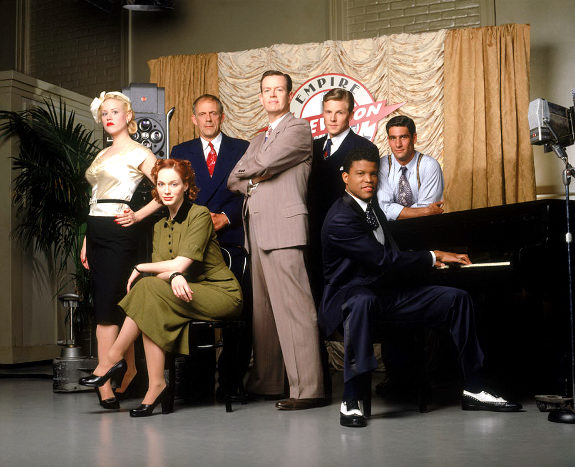 |
ABOUT — THE CAST — THE PREMISE — THE INTERVIEWS — ALBUM — MORE ABOUT THE BIG TIME
The Big Time was a "back door" pilot that aired on the TNT network in 2002 for a continuing series or miniseries about the days of early television, when broadcasts were live, sponsors were on the set influencing production (you must smoke the sponsors' cigarettes, not another brand!), minorities had to tread their way carefully, and radio stars were making the move to the new medium. Because the film was intended as a pilot, many characters were introduced, in the hope that we would learn more about them as the series progressed. Sadly, the movie was not picked up for a series. I refer to the film as "the one that got away" because as a Remember WENN viewer still homesick for Remember WENN, I enjoyed its "WENNish" vibes. (And, like AMC, TNT could have given us a DVD...)
![]()
- Audrey Drummond: Christina Hendricks
- Robert Sloane, a.k.a. The Colonel: Dylan Baker
- Walt Kaplan: Michael B. Silver
- Timothy Wilkison: Shane Mikael Johnson
- Joe Royal: Sharif Atkins
- "Doc" Powers: Christopher Lloyd
- Marion Powers: Molly Ringwald
Guest Stars: - Vaughn Clay: John de Lancie
- Ed Wynn: John Byner
![]()
TNT's original description, from their website:
Golden Globe nominee Molly Ringwald, Emmy® Award winner Christopher Lloyd and Dylan Baker (Road to Perdition) star in the Turner Network Television (TNT) original movie The Big Time, a fast-paced drama about the early days of television and the entrepreneurs who brought a new industry to life. The Big Time airs Sunday, Oct. 20, at 8 p.m. (ET/PT) on TNT. Christina Hendricks (Beggars and Choosers), Michael B. Silver (I Am Sam), Shane Mikael Johnson (Behind Enemy Lines), and Sharif Atkins (ER) also star. The Big Time is produced by John Wells Productions in association with Warner Bros. Television. John Wells (The West Wing, Third Watch) and Carol Flint (Earth 2) reunite and serve as executive producers; Flint also wrote the script. Wells and Flint previously teamed on China Beach and on ER, for which they won an Emmy in 1996 as part of ER's producing team. Paris Barclay (The West Wing, NYPD Blue) serves as co-executive producer and director.The Big Time is set in Manhattan in 1948 during the exhilarating early days of a new industry. Molly Ringwald plays Marion Powers, the network head's new bride who discovers a unique opportunity in the burgeoning landscape of television. Christina Hendricks stars as Audrey Drummond, an energetic young woman from the Midwest who moves to The Big Apple to join the emerging television network. Michael B. Silver plays Walt Kaplan, a floor manager with aspirations to direct. Dylan Baker stars as The Colonel, a tirelessly devoted producer and vice president of programming committed to making the young network a success. Shane Mikael Johnson plays Timothy Wilkison, a charismatic junior ad agent aiming to create and direct programming. Sharif Atkins stars as Joe Royal, a twentysomething jazz musician who struggles to balance his passion to succeed as a musical artist and founding member of his band, The Royal Flush, with the responsibility to provide for his family. Christopher Lloyd stars as Doc, the brains behind Empire Television, whose engineering brilliance has poised the network on the cutting edge of a new era.
Several storylines run concurrently as the film opens. Audrey Drummond, who is the viewers' representative to the era, is new to New York City after previously doing war work in a bomber plant in Michigan, her home state. She has arrived at Empire Television to work as a typist for "the Colonel," Robert Sloane, who is the harried executive head of Empire. Sloane is nervously awaiting the arrival of his business partner, "Doc" Powers, the engineer behind Empire's hardware, since Doc is supposed to testify before the FCC. In the studio, ambitious floor director and aspiring director Walt Kaplan is trying to pursue his desired career, while fast-talking sponsor representative Tim Wilkison tries to keep his clients happy, and the studio crew awaits the arrival of noted radio performer Vaughn Clay, who will be playing the lead role in Empire's much-anticipated production of Our Town. Another storyline is provided by African-American musician Joe Royal and his band, the Royal Flush, all of whom are fighting the color barrier in trying to get a job on television. When Doc Powers finally arrives, the studio is aghast to find out he has brought a new bride with him, a peroxide blonde whom Doc had saved from committing suicide on the train, and who looks like a floozy and a golddigger. The film follows Audrey's introduction to television production, problems associated with The Royal Flush taking a "gig" on the network, the rehearsals for Our Town and the sponsorship battles around it, and the repercussions of Doc's abrupt nuptials, plus the Our Town crew's attempts to cope with the egotistical Vaughn Clay.
Despite some sketchy characterization that I'm certain the producers intended to fill out in a series, this was an entertaining film with a lot of potential against the endless crime and medical shows then on the air. It was also a novel period piece, Mad Men being several years in the future. Many intriguing future storylines were set up: possible negative audience reaction to The Royal Flush appearing on Empire Television (and possibly the withdrawal of sponsorship from bigoted advertisers and protests from certain groups in the audience), Audrey's relationship with Kaplan (a married man who appears to be attracted to her), and Marion's increasing influence in her new role at the station. There is also a hint in the Colonel's conversation with his father that the character is gay, something Sloane would have needed to keep close to his vest in that strait-laced era. Further drama would be provided by more live broadcasts, sponsor clashes, and other character relationships. Desperate ex-vaudeville performers, fading radio stars, and aspiring actors would have lent additional stories.
The period flavor of the late 1940s was also quite compelling. Fashions, old production equipment (especially the massive cameras and studio lights used in the 1940s), hairstyles, furniture, and makeup were all reproduced faithfully (with a few slipups; the script refers to "paramedics," a term not used until the 1970s). As in the film My Favorite Year, the chaos of live broadcasts are well documented, with colorful characters like ventriloquists, performing animals, missing props, and malfunctioning cameras popping up to surprise the studio crew as well as the viewers.
![]()
Following are interviews that were conducted at the time the movie premiered on TNT, but no longer available on their website unless you want to dig through the Wayback Machine like I did:
A Conversation with Molly Ringwald (Marion Powers)
Q: What are your perceptions of early television?
A: It seemed very exciting. I was struck by how much early television reminds me of our experiences with the Internet today. I know a lot of people who were involved with the Internet in its early stages. I still remember when some people were saying that the Internet would fail, while others believed it to be the wave of the future. I think it's similar to people's initial perceptions of television.Q: What did you think after reading the script?
A: I think what I loved the most about the script, other than the fact that it's set in just a great time period, was the post-war optimism. I was also very drawn to my character, Marion Powers. It's just a very different kind of role for me. I knew this was a part that I had to play.Q: When you're in a film like The Big Time, what do you do to perfect your role?
A: I think that the clothes and the hair make a huge difference. I walk differently. I start to talk differently. It really sort of transports me into another time. Even though we're not doing period dialogue, my speech just naturally changes. It helps that the set is amazing. It's just a wonderful stage that they built for this project. The realism is just amazing.Q: What do you like about working on this film?
A: The exciting thing for me is that we get to see a past time period in a very modern way. A lot of times you see period pieces and it's hard to relate to them. I think audiences will be interested because the energy in this film will give people that feeling of what it was like to be there - the speed, the intensity, the humor and the drama.Q: What would you like audiences to take from The Big Time?
A: I just want them to be entertained. I think it's going to be a really enjoyable movie, and I want for people to get a glimpse of where television came from. I think this was a very rich and interesting time.A Conversation with Christopher Lloyd (Doc)
Q: What is The Big Time about?
A: Overall, The Big Time is about the beginning days of television. Beyond that, this film touches on a lot of issues we still face today: sponsorship, censorship and racism. At one point, my character becomes very upset when a black musician is speaking to the television audience on one of the network's programs. It also deals with the idea of advertising vs. artistic freedom. We still have some of these issues today, but I think they were more clearly defined in the '40s and '50s.Q: What attracted you to this character?
A: I thought Doc was a very interesting and complicated character. He didn't have very much business sense but was a genius. He was only interested in his craft and didn't understand the advantages his inventions would have on the development of television. He also had a very unstable personality that sometimes added to his confusion of how his discoveries were being used.Q: How was it, working with the other actors?
A: This movie has a great cast. These young actors conveyed the enthusiasm those young people involved with early television must have had - the thrill of latching on at the beginning of something big. They really captured that excitement.Q: What helped in creating the 1940s feel while doing this project?
A: They were quite meticulous in reproducing the costumes, hairstyles and cars of that period. The equipment in my character's laboratory and the televisions and cameras in the studio were also replicated. We all looked the period, but The Big Time still feels contemporary because of some of the social issues the characters had to handle.A Conversation with Dylan Baker (The Colonel)
Q: What did you enjoy most about this project?
A: What fascinated me about this project was learning about early television. I loved hearing it and seeing different pieces of it. I also enjoyed talking to people that worked in television at the time.Q: Did you learn anything about the equipment that was used in early television?
A: Right before the war, the cameras were huge and unsophisticated, and the lights had to be blazing. Actors could be in the light for only a short time before they'd start wilting. The lights would just bake them. After the war, they realized that they could use much less light. The cameras were still huge dinosaurs, though.Q: Explain your character's role in The Big Time.
A: My character is The Colonel. I'm the money guy behind the network, and I'm paired up with Doc, who is played by Christopher Lloyd. He is the brains behind the inventions that we need to get our network off the ground. The Colonel runs the day-to-day operations of the network and brought this group of people together to help him make the network successful.Q: What was it about the script that attracted you to The Big Time?
A: What I liked most about The Big Time was that it didn't try to create this hazy pink cloud around early television - it wasn't glorified. It's really all very fascinating.Q: How does the set design help you to re-create the '40s?
A: The set is absolutely huge. What makes everything even better is that we work with old television sets that have 17 knobs on them. All of these elements add to the general feel of the '40s. Although this is a period piece, Carol Flint's writing and Paris Barclay's directing make it feel like it's happening now.A Conversation with Sharif Atkins (Joe Royal)
Q: What is The Big Time about?
A: The entire movie is set around the birth of a fictitious television network. The network is trying to get everything up and running so that it can compete with the bigger networks.Q: What have you learned about early television that you weren't aware of before The Big Time?
A: I have learned that it was time and a half just to get television up and running. There was a lot going on all the time, and everything was really fast-paced. It's amazing because there was no preparation for anything. You just went at it and went for broke.Q: Your character has a great story line. Can you talk a little bit about his role in The Big Time?
A: Joe Royal is a jazz musician from Harlem. He and his band are introduced to the studio when their agent sends them to audition for a television program. He is excited about this gig because he will have steady income. He's thrown into chaos, though, and he has to struggle for the network to accept him for who he is.Q: Although The Big Time was set in the late '40s, your character has a rather contemporary style to him. How did those two things mesh?
A: A lot of things were happening with Joe Royal, and I don't think there had been a whole lot of black musicians on television at that time. That was new. That was fresh. In that sense, I think it meshes quite well.Q: When you first read the script, what made you really want to be in The Big Time?
A: Joe Royal definitely stood out. There's just so much that you can do with a jazz musician in the late '40s. I just think it's great. It was everything to me as an actor that I could want.Q: What do you hope audiences take from The Big Time?
A: I hope the audience will realize that television was and is hard work. Because it was new, everybody pitched in. Everyone was doing what they could to get that little section on board and running.A Conversation with Shane Mikael Johnson (Timothy Wilkison)
Q: What is The Big Time about?
A: A fledgling network is trying to get a foot in the door with the bigger networks, but their main goal is to not sell themselves out. The network is trying to establish itself as the new kid on the block.Q: What did you learn about early television that you didn't know before this project?
A: I think the main thing that I learned was how everything was recorded live, so there was a lot of pressure for people to perform on the spot. It created a great atmosphere for drama because of the immediacy in trying to get something prepared, even for the commercials.Q: There are a lot of layers to this story. What attracted you to The Big Time?
A: What interested me the most was that people could just get in there and put their heart out in the open and create whatever the heck they wanted. If someone didn't show up, you could figure the unit out, and you could get out there and take on that role.Q: Can you talk a little bit about how the war brought on the excitement of television?
A: I think that technology at that time was growing quickly, especially after the war. That's what put television on the map. The key to television was to figure out how to make something that would be special.Q: Did any of the actors in the movie get the opportunity to talk to people who did live television?
A: We talked to people who were involved in the early days of television and found that those people were really excited about their work. I think they were aware that they were doing something new and unique. The live thing just became second nature to them. [I wish these interviews had been a bit more in depth! I would have loved to have known who they spoke to who had done live television!]Q: Your character's job centers around advertising. How important was advertising during the upstart of television?
A: Advertising was extremely important. During that time, you prayed for someone to want to sponsor your show. One or two advertisers would literally sponsor an entire show. Those commercials were also live, so I think that threw an added branch into television.A Conversation with Christina Hendricks (Audrey Drummond)
Q: What is The Big Time about?
A: It's about the excitement of a team of people charting completely new territory in television and bonding together to discover something new. I think it's very exciting.Q: What have you learned about early television that you didn't know before you got involved with this project?
A: I've learned so much. When I thought of early television before, I really thought of Sid Caesar and more slapstick comedy. I didn't realize that they took these full-length dramatic plays and adapted them, for one. We had a luncheon with a group of people who worked in the early days of television, and it was intense. They worked in very stressful situations - especially with live television - and that made them work together that much more.Q: Did anything about the script particularly catch your attention?
A: It's very fast-paced, and the way Carol Flint wrote the script, it did not stray too far from how things really were at that time. I think that a woman's role was very different then too, and you had to constantly consider what you said to men you worked with.Q: What about The Big Time intrigued you the most?
A: I think I could really relate to my character. I was just like Audrey when I moved to New York City. I was overwhelmed, but I was excited about trying something new.Q: What would be your greatest hope for people to take away from The Big Time?
A: I think it's just fun to see a movie about the beginnings of television. I hope audiences will sit and think about it. It's cool trying to put yourself in that place and imagine what it uld be like without television. It's bizarre.A Conversation with Michael B. Silver (Walt Kaplan)
Q: What did you find out about early television after The Big Time that you didn't know before?
A: Well, first of all, there was no way of taping anything. It all was live. Everything just kept going and going, and nothing was taped. Consequently, all of those original live shows are gone and are just floating around in space somewhere.Q: What about some of the early technology?
A: People used to collapse under the lights on television sets. The early cameras also could not move, and they thought that putting wheels under the camera would make it fall over.Q: Talk a little bit about just being in The Big Time environment.
A: It's true that, when you walk in here, you feel like you're back in the '40s. The set is huge. It feels like a building in New York back in 1948. All the old technology is right here. It's an amazing set.Q: Can you talk a little about how your character interacts with the rest of the story?
A: Walt, my character, was a fighter pilot in the war. He comes to work for this network, and he is accustomed to being in high-pressure situations. He deals with every aspect of the network but doesn't care about the money or the politics of it, which is naive. [Walt was actually a bomber pilot.]Q: What do you hope audiences take from The Big Time?
A: I want them to realize that television has become a large part of all of our lives in every area. It's interesting to watch the origins of it. It was like it became a friend of the family.A Conversation with John Wells (Executive Producer)
Q: What is The Big Time about?
A: The Big Time is set in Manhattan in the late 40's during the advent of television. It is the story of a group of people from different walks of life who are brought together to pioneer the burgeoning industry of television.Q: What attracted you to this project?
A: Carol Flint and I have worked together many times since we met on China Beach. She is not only a close friend but also an extremely talented writer. So when she brought me this idea about the pioneers of our industry, I knew I had to be involved. As someone who is involved in television, I couldn't resist chronicling the energy and excitement of the time.Q: Tell us about the cast.
A: For a project about the early days of a new industry, we knew we needed to find fresh faces that could tell the story with the innocence and excitement that would have been felt at the time. In Sharif Atkins, Christina Hendricks, Shane Mikael Johnson and Michael B. Silver, we saw a rare combination of the talent and enthusiasm we needed to accurately convey the atmosphere during those exciting days. Who would have thought that we would cast everybody's favorite redhead as the blond bombshell! Molly Ringwald is famous for her sweet, young, girl-next-door roles in the John Hughes films, but she impressed us so much with her dramatic performance and her ability to transform herself that we had to have her as the powerful Marion Powers.As soon as I read Carol's script, Dylan Baker came to mind for the role of The Colonel. His combination of strength and leadership were the characteristics needed for the man who was responsible for guiding this young network to success.
Christopher Lloyd was the last role we cast. Christopher is best known for his comedic work, but I have always been a fan of his dramatic performances. I knew that he could bring an element of eccentricity to the man who was responsible for inventing and developing this incredible new technology.
A Conversation with Carol Flint (Executive Producer / Writer)
Q: What is The Big Time about?
A: It's about an introduction to the world of technology. It's about what turned America into what it is today. It has a contemporary feel to it. It's really about young people entering into a business where there are no wise men.Q: What research went into The Big Time?
A: I did a lot of research. It is a very historical project, so, in this case, it was appropriate. I researched for about six months as a full-time job. Everyday, I got up and went to the Museum of Radio and Television or went to the Television Academy archives.Q: Did you always know you wanted to write about the start of television?
A: I always thought I'd be a playwright, so when I came into the world of television, I hadn't ever really studied it. I'd seen a lot of it but never fully connected with it. Some of it was me finding out about the medium that I worked with now.Q: What energy does live television bring?
A: The energy of live television is absolutely what I got a taste of. I wrote and produced the live episode of ER, and a lot of the energy that came out of that production is what fed the research into this project. It gave me a taste of what it must have been like for the pioneers of television, even though they were actually making it up as they went along.Q: What was your favorite part of the story?
A: I love the fact that this film has an ensemble cast with the multiple story lines interwoven. That's really what I fell in love with.Q: What would you like audiences to take from The Big Time?
A: I want audiences to feel like there's a lot to digest and that they are learning about the start of television. I want their eyes to be glued. I want it to become part of their lives.A Conversation with Paris Barclay (Director / Co-Executive Producer)
Q: What research went into The Big Time?
A: Actually, Carol did most of the research before she wrote it. She supplied us with two huge notebooks with pictures and articles of information. She also arranged a lunch with some real pioneers in television.Q: Can you talk a little bit about the technology that they used to put together a television program?
A: They used an iconoscope camera, which was basically tube technology. It looks very different from what we are accustomed to. Since there were no videotapes, all it did was present images on a monitor briefly.Q: How much pressure do you think live television brings?
A: That's something that I would never want to do. Apparently, they thrived on the idea of doing a play for 50,000 people who had a television set. People who had nerves of steel would be the only ones who wouldn't feel any pressure with doing live television.Q: What would be your greatest hope for people to take away from this film? A: I think the best thing that audiences can get out of The Big Time is that television, oddly enough, is a very noble profession. You have a chance to really see people as heroes in the communications industry. I hope they develop a new respect.
![]()
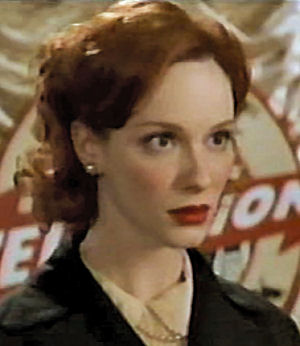
Audrey Drummond
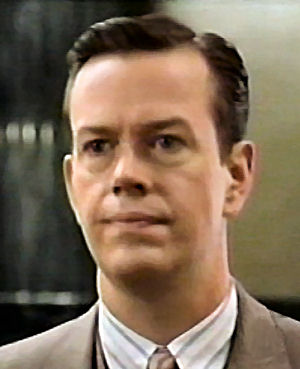
Robert Sloane, a.k.a. The Colonel
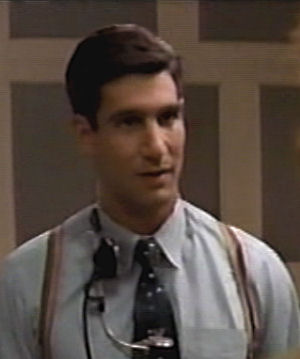
Walt Kaplan
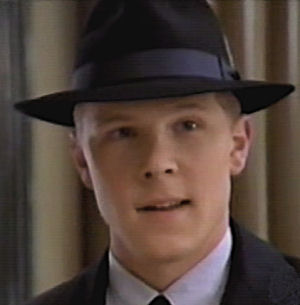
Tim Wilkison
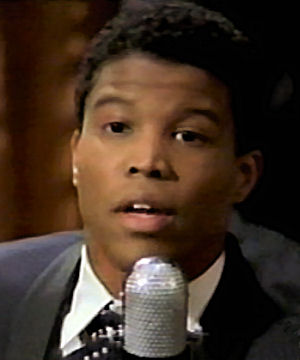
Joe Royal
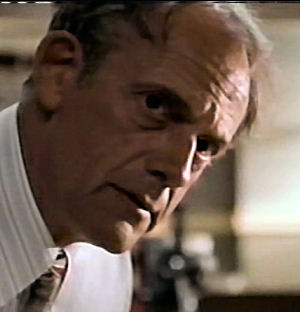
"Doc" Powers
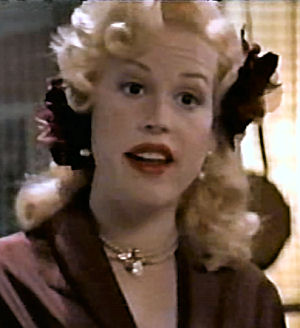
Marion Powers
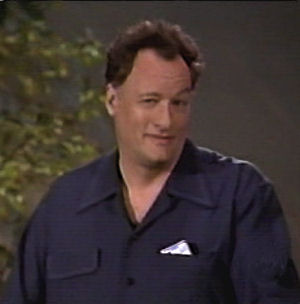
and John DeLancie as Vaughn Clay
![]()
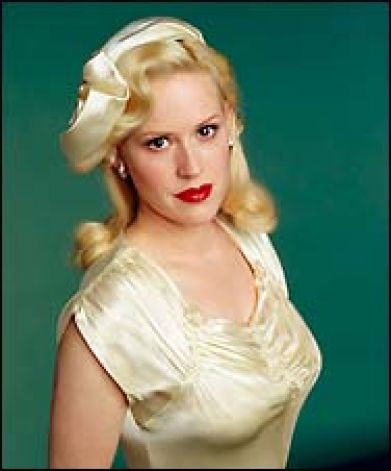 It was released on VHS and can be found on e-Bay. It was not released on DVD; more's the pity.
It was released on VHS and can be found on e-Bay. It was not released on DVD; more's the pity.
Seattle Post-Intelligencer review
Brief CBS News article on Molly Ringwald
Review on Sign On San Diego (columnist Robert Lawrence talks about Doc's resemblance to Allen DuMont.
If you missed this great movie, here's a detailed plot synopsis from The Paley Center for Media
Rob Owen review in Pittsburgh Post-Gazette (Owen, a Remember WENN fan, certainly didn't miss the resemblance between the two series)
New York Times archived review (nice article that talks about the early days of TV)
Jacksonville Times-Union promo
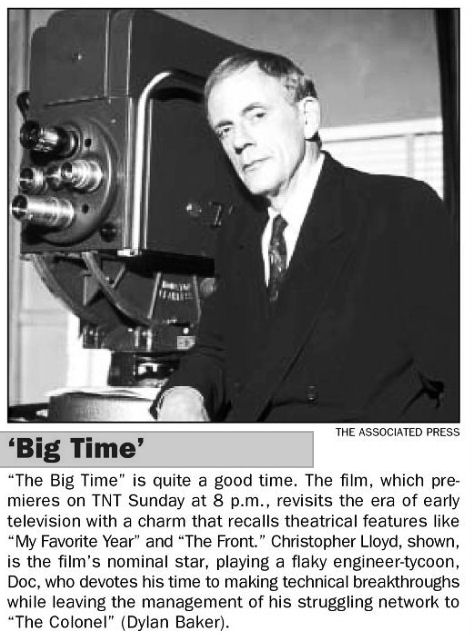
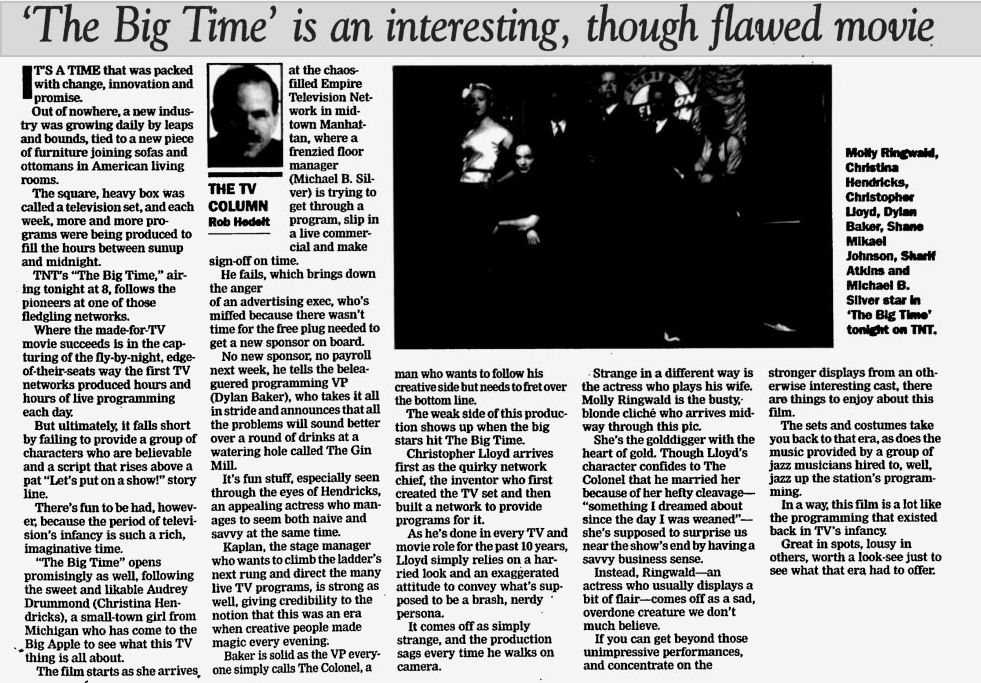
| The Big Time was a production of the TNT network in association with Warner Brothers. The interview and the accompanying photos are from a TNT website last updated in 2009. This is a fan page. No copyright infringment is intended. It was such a fun movie I thought it deserved a tribute. Any opinions stated are my own and do not reflect the thoughts of the creators or producers. |